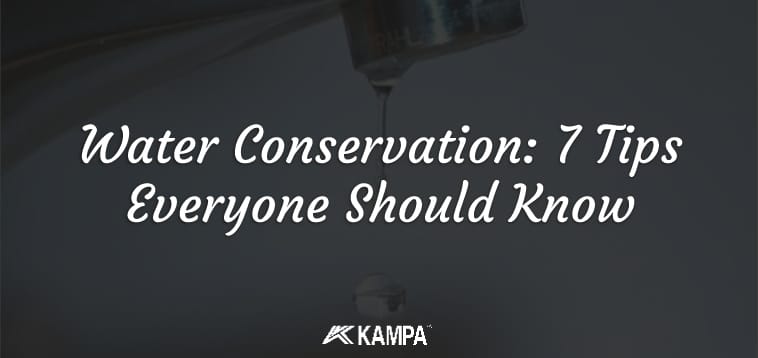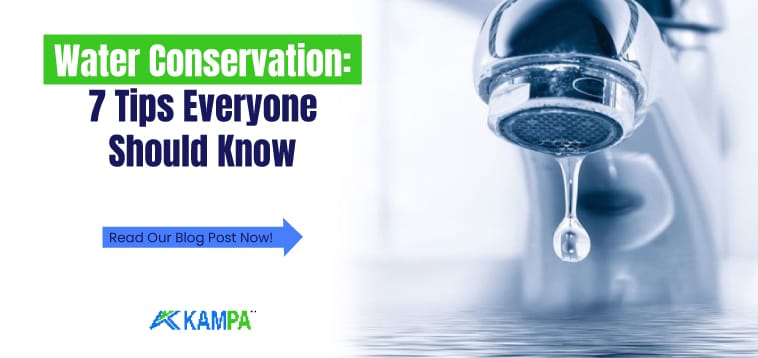Water Conservation: 7 Tips Everyone Should Know
As water consumption and drought increase=Water conservation, more restrictions are needed for areas that are exposed to adverse conditions. We must do what we can to save water.
Table of Contents
We cannot do anything about the amount of snow and rain that falls. Conscious use of this precious resource in your home can help us a lot.
Preventing water waste, reducing water consumption is important considering the water needs of today’s world and the depletion of clean water resources.
How to save water? Here are suggestions that will significantly reduce the liters and liters of water flowing out of the taps. Washing by hand instead of using washing machines saves energy and wastes it unnecessarily.
The following tips can help you save waterand be much more resource conscious in your home and everyday life. The loss of water when brushing teeth and using the dishwasher is not preferred causes resource depletion.
Don’t Leave the Taps Open

First and foremost rule. Do not leave taps running when not in use . Most consumers often overlook or ignore this detail.
- Waiting for the water to heat up,
- When brushing your teeth
- Isn’t shaving the most obvious example?
What if we were aware that the water draining down the drain is consumed water? You can take precautions by filling a container with cold water while waiting for the water to warm up. When brushing our teeth or shaving, you can turn off the taps when not needed.
Watch What You Wash to Save Water
Washing old food, paper towels, garbage, trash, discarded items, cardboard cups, causes considerable damage to the water supply and plumbing in your home.
Some of these items can create a simple clog or blockage that prevents drainage. Minor blockages can be easily resolved by homeowners.
Toilet waste is another issue that needs attention. Materials such as feminine hygiene products, cigarette butts, paper napkins and garbage cause blockages when they are thrown down the toilet drain. Much more water and chemicals are needed to remove the blockages.
The use of chemicals to flush waste medicine bottles, chemical drums or to remove blockages leads to problems that are undesirable to face. It can contaminate public water systems used for wastewater. It can release harmful substances into natural source waters.
One of the best ways to increase water efficiency and conserve resources is to be careful what you put into the water supply.

Shorten Your Shower Time
Everyone loves a relaxing bath, but an unnecessary shower means twice as much water. If you must take a bath, don’t fill the tub. If possible, replace bathtubs with shower trays.
Use a Low Flow Shower Head
To minimize the amount of water you use during a shower, you may want to consider changing your shower head. Low-flow shower heads allow you to save plenty of water without sacrificing water pressure or other desirable amenities. This idea can also be an excuse to replace old fixtures.
Set a Timer to Save Water
Set aside a maximum of 10 minutes to minimize your shower time. Keeping your shower time under 10 minutes can save 10000 gallons of water per year.
Set a timer or use a waterproof watch to help you know how much time you spend in the shower. You can also create a music playlist that goes on for as long as you want, which can help you determine if you’re taking too long.
Be Careful with Cooking and Washing Water
Generally, the most frequent water consumption occurs in kitchens.
- Cooking,
- When cleaning vegetables and fruits
- Washing the dishes,
- Pay attention to the amount of water consumed while cleaning.
Try to use as little water as possible when cooking. Less water helps you save water while vegetables cook more deliciously.
When washing dishes by hand in the sink, make sure that the water does not run continuously. You can try washing with detergent water in a container. Using a dishwasher will help you save water.
But do not run the machine before it is fully loaded. Prefer to buy energy-saving and ergonomic machines.
Before washing the vegetables and fruits, you can fill a bowl with water to remove the dirt. Afterwards, it will be enough to wash them under the tap for a short time.
Utilize Wastewater to Save Water.
To save water, recycle the water you save while waiting for the water to heat up and while washing vegetables.
You can use pasta water, leftover water from the kettle, teapot or melt old ice cubes to water your flowers.
Collect rainwater. You can use the collected rainwater to water the lawn in the following days. If you have a drainage pit, you can transfer the accumulated rainwater into a barrel with a submersible drainage pump. This way you will not need to use natural spring water for irrigation.
You can also use a simple bilge pump for small wells where puddles of water can damage your house or garden. Bilge pumps are battery-powered, small but functional pumps.
Comply with Local Water Restrictions to Save Water
Water restrictions are imposed regionally when there are expected drought problems, existing drought problems. Especially in summer periods, water cuts are common.
Consumers are usually notified before a water cut is made. As a precautionary measure, do not hoard and waste excess water. Save enough water, as much as you can use.
Track Your Water Bills to Save Water
Check your monthly water bills. Small changes in your daily habits can help you save a lot of money on your bill. Check if you are saving money on your bills.
Saving water is a task for each of us and these simple tips can help you change any wasting habits you may have.
You can share your own suggestions with us by commenting below. Do not forget to share it on social media accounts to contribute to water saving and raise awareness.
After paying attention to water saving, the smell, taste and appearance of your water is very important, to become a good water treatment machine Click here for detailed information.

